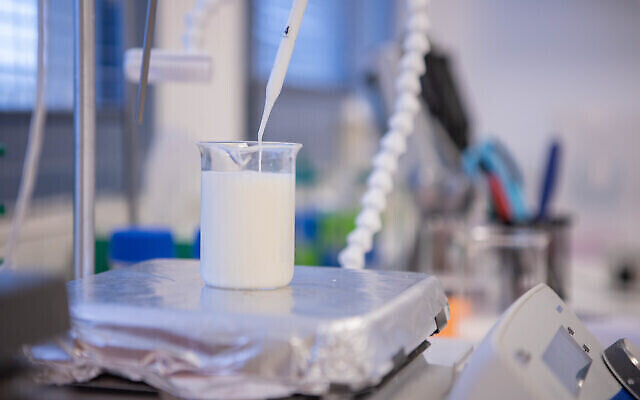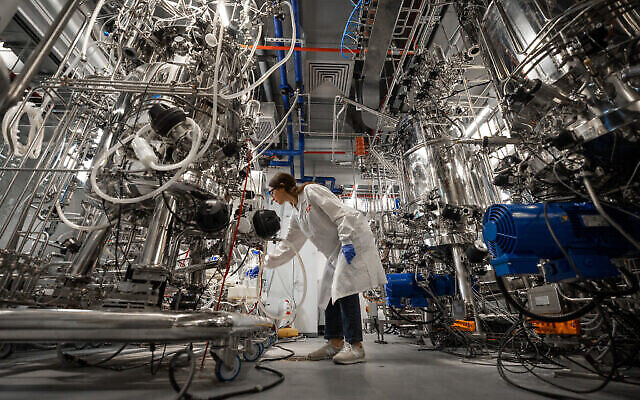Israel’s alt-protein market up 450%: report
Israeli startups in sector raised over US$600 million, says Good Food Institute Israel study

Israel’s alternative protein sector, a segment of its vibrant food tech industry, grew by about 450% in 2021 from the previous year, with Israeli startups in the field raising some $623 million in investments, according to a report this week by The Good Food Institute (GFI) Israel, a nonprofit organisation that seeks to promote research and innovation in food tech.
The overall food tech industry is a broad field that includes nutrition, packaging, food safety, processing systems, and novel ingredients, in addition to alternative proteins. The latter comprises plant-based substitutes for meat, dairy, and egg; cultured dairy, meat and seafood; insect proteins; and fermentation products and processes.
The institute estimated that the $623 million in investments in 2021 accounted for about 12% of the global capital raised for the sector worldwide last year (about $5 billion) and was “second only to the US – with regard to both the amount of capital raised and the number of active companies in the space.”
In addition, 70% of all investments in Israeli food tech companies went to alternative proteins startups in 2021, GFI Israel said.
Some of this funding, about 13% according to the study, came through government programs. The Israel Innovation Authority, a government agency, recently earmarked NIS 220 million ($69 million) for four new consortiums to lead development and acceleration in new fields, among them cultivated meat.
In the cultivated meat sub-sector alone, Israeli companies drew just over $500 million in investments, accounting for about 36% of total investments (about $900 million) in the space worldwide in 2021, and also second only to the US with about $700 million in funds for startups in this field.
According to the report, 11 new alternative protein companies were founded in Israel over the course of last year — six cultivated meat and seafood companies, four plant-based protein companies, and one fermentation process company.

The report said that the significant growth in the Israeli alternative protein sector was attributed to large investment rounds in companies coming close to the commercialisation stage, expanding their operations, and targeting global markets.
Israel’s Future Meat, a biotechnology firm that creates chicken, lamb, and beef products made from animal cells, raised the largest single investment in an alternative protein company last year with $347 million in a Series B funding round in December. The company said it is using the funds to build a production facility in the United States, and hopes to hit US market shelves later in 2022, pending regulatory approval.
Last summer, Future Meat opened what it called the world’s first industrial cultured meat production facility in Rehovot, its headquarters, with the capacity to produce 500 kilograms (about half a ton) of cultured product per day.
The second-largest investment raised by an Israeli food tech startup (announced in early 2022) was $120 million for Remilk, a developer of animal-free milk and dairy. The investment was the single largest in a cow-free dairy company to date.
Remilk has set up production facilities in Europe and the United States, where it is already working with leading food companies, and collaborating with regulators and rabbinic authorities to get its product cleared and certified, co-founder Aviv Wolff said in November on a tour of the company’s facilities in Rehovot.

The $105 million investment in Aleph Farms, a maker of cultivated meat that grows steaks from modified cattle cells, was the third-largest investment in the Israeli food tech sector in 2021. The investment included backing from actor and environmental activist Leonardo DiCaprio.
Israeli company Redefine Meat, a maker of 3D-printed plant-based meat products, also saw significant traction in 2021, announcing partnerships at high-end restaurants in the UK, Germany, and the Netherlands including Michelin-starred eateries. Its range of products, called New Meat, includes animal-free whole cuts, burgers, sausages, lamb kebabs, and ground beef.
In Israel, dishes with Redefine Meat’s products are sold in some 200 restaurants and establishments, including Coffee Bar and Hotel Montefiore in Tel Aviv.
In 2022 so far, Redefine Meat pulled in an investment of $135 million to fund production lines in Israel and the Netherlands, as well as expand its partnerships with restaurants and eateries.
Nir Goldstein, managing director of GFI Israel, said the new report “unveils how Israel has become a global leader in alternative protein research, innovation and public investment.”

“The next few years will determine the Israeli ecosystem’s long-term position in the future of our global food system. Can it sustain its leadership? Will it leverage it and become an industrial leader as well, and promote Israeli national food security?” he went on.
In recent months, GFI Israel put together a separate report with consulting multinational EY that argues that Israel will need a national plan to support its growing food tech industry if it hopes to maintain a key role in the sector over the coming years.
A strong local food tech industry can establish food security and become a strategic national asset for Israel, the report said.
“Israel is in a global position worldwide for food tech,” Goldstein told The Times of Israel in January. But countries such as Canada, India, the UK, the US, Denmark, and Singapore — the first country in the world to approve the sale of cultured chicken to consumers in December 2020 — are already rolling out massive funding for national food technology programs. If Israel wants to stay ahead, “it will need a national strategy,” he said.
Times of Israel

comments